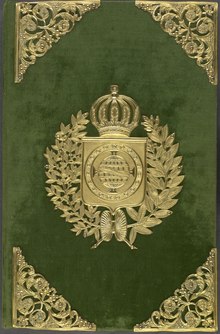
Back Constitució brasilera de 1824 Catalan Brazila Konstitucio de 1824 Esperanto Constitución brasileña de 1824 Spanish Constitution brésilienne de 1824 French Constituição brasileira de 1824 Portuguese
| Political Constitution of the Empire of Brazil | |
|---|---|
 Cover of the imperial constitution of 1824 in the custody of the Brazilian National Archives | |
| Overview | |
| Jurisdiction | Empire of Brazil |
| Date effective | 25 March 1824 - 15 November 1889 |
| System | Unitary parliamentary constitutional monarchy |
| Government structure | |
| Branches | 4 |
| Chambers | Bicameral |
| Executive | Emperor |
| Judiciary | Supreme Court of Justice |
| Federalism | Unitary |
| Electoral college | Yes[1] |
| First legislature | 6 May 1826 |
| First court | 9 January 1829 |
| Location | Brazilian National Archives |
| Commissioned by | Pedro I of Brazil |
| Author(s) | Council of State |
| Signatories | |
| Full text | |
The Political Constitution of the Empire of Brazil (Portuguese: Constituição Política do Império do Brasil) commonly referred to as the Constitution of 1824, was Brazil's first constitution, issued on 25 March 1824 and revoked on 24 February 1891. In force during the period of the Empire of Brazil, it was issued at the emperor's request, that is, unilaterally imposed by the will of emperor Pedro I, who had ordered it from the Council of State. Pedro had dissolved the Constituent Assembly in 1823 and, through the Constitution of 1824, imposed his own political project on the country. The same Pedro later issued, in Portugal, the Constitutional Charter of 29 April 1826, inspired by the Brazilian model.
It remained in force for 65 years, until the promulgation of the Constitution of 1891, followed by Decree No. 1 of 15 November 1889, which replaced the political ordering of the Empire of Brazil. It was the longest-running constitution in Brazil. Among its innovations were freedom of religious worship (although the official State religion remained Catholic), freedom of the press and opinion, and the institution of the Moderating Power.
- ^ Ferreira 2005, p. 98.